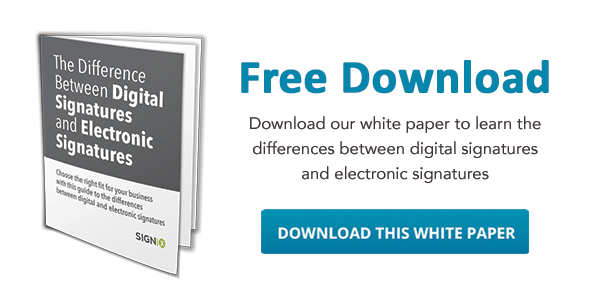For most people who enter into contracts on a daily basis, the terms “electronic signature” and “digital signature” seem like the same thing. From a legal and technical perspective, however, an electronic signature and a digital signature are two very different forms of agreeing to a contract.
 Electronic Signature
Electronic Signature
At its core, an electronic signature can be any type of electronic consent or approval. More specifically, the ESIGN Act defines an electronic signature as an “electronic sound, symbol, or process attached to or logically associated with a record and executed or adopted by a person with the intent to sign the record.”
So what does that mean? In layman’s terms, it means that an electronic signature can be any type of audio file, a graphic representation, or a procedure that is somehow associated with an electronic record. It can be something as simple as a written name or a button that says “I agree,” or as complex as a biometric signature…it’s very much an umbrella term.
It is important to remember that not all electronic signatures are weighed equally in the eyes of the law, and a signature that cannot be verified for integrity and security is going to be less defensible in court. That is one of the reasons why many professional businesses require that customers and clients do more than just type in their names or click “I Agree” when they sign important documents electronically. This is also why most companies require that clients use defensive e-signature platforms when entering into any type of binding agreement.
Digital Signatures
A digital signature is a type of electronic signature that takes security, integrity and defensibility much more seriously.
Digital signatures are frequently compared to fingerprints, since each contains a unique set of data that is hidden to the human eye. With digital signatures, this data is placed within the computer code and it can be used to indicate consent and to prove whether a “signer” has created or modified a file. If anything within a contract is changed or altered after the digital signature has been put in place, then that change will be noted and the signature will become invalid. This ensures the integrity of every contract and helps protect against forgery, which is a common concern with electronic contracts in general.
Used within the right system, digital signatures not only lock down signed documents, but also can keep track of the state of a document over time, allowing you to go back and see what each signer was looking at when they signed the document.
Digital signatures are an excellent tool that businesses and consumers can use to authenticate contracts that are signed electronically. Documents executed with a digital signature platform ensures that any contracts being signed electronically will be just as legally defensible — if not more so — than contracts signed with pen and paper, should the issue ever be brought to court.
%20formatted-1.png?width=2528&height=739&name=SIGNiX%20Logo%20Main%20(white)%20formatted-1.png)

